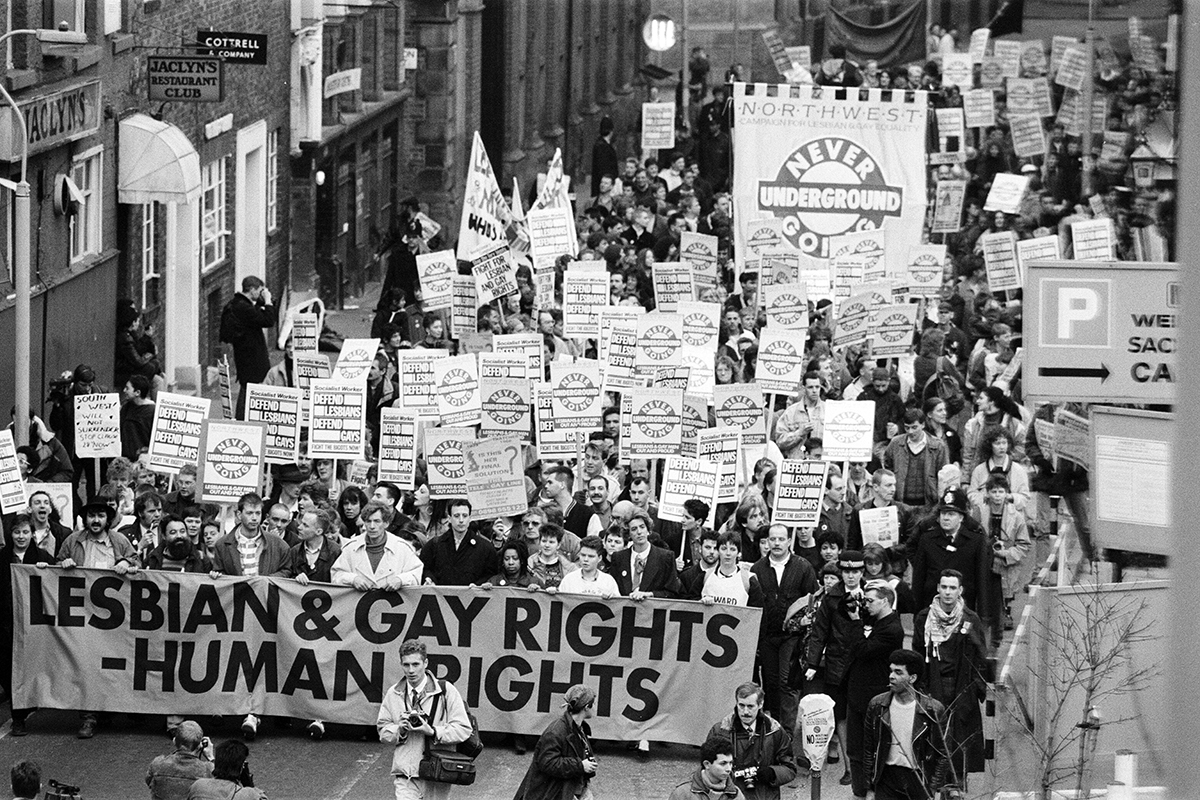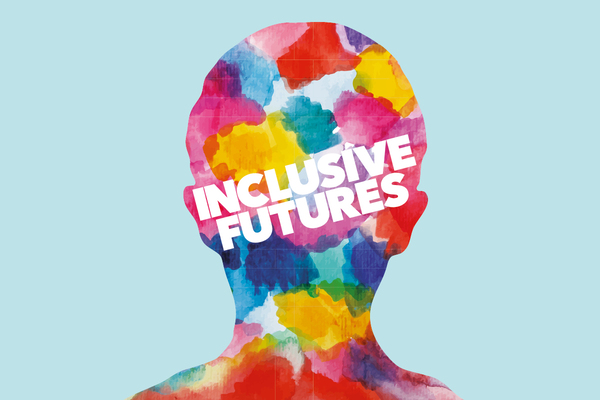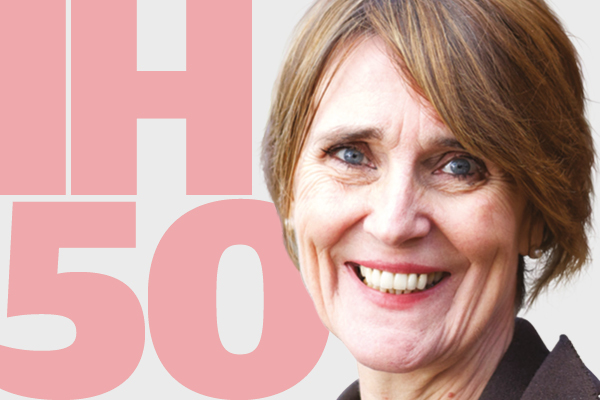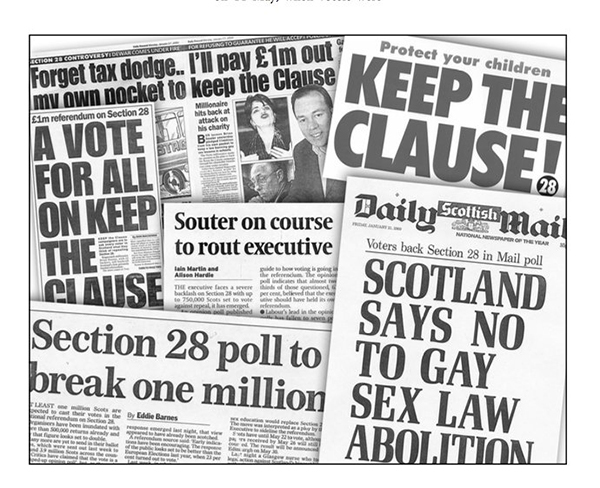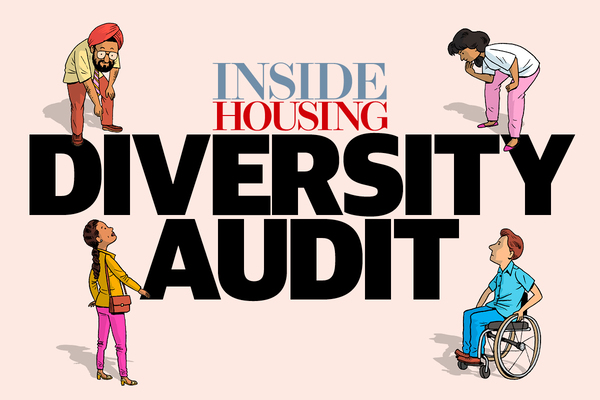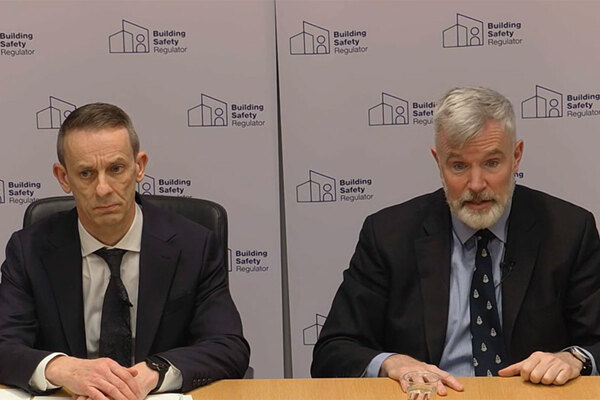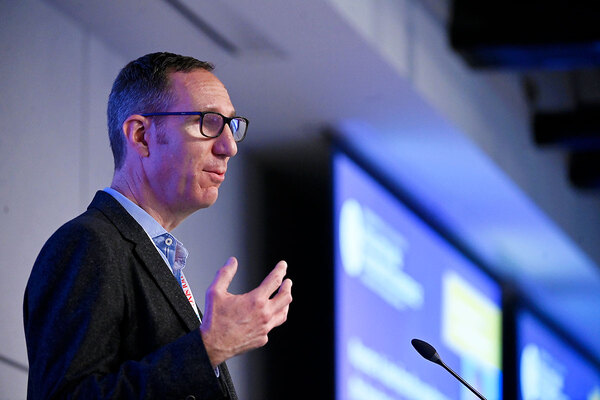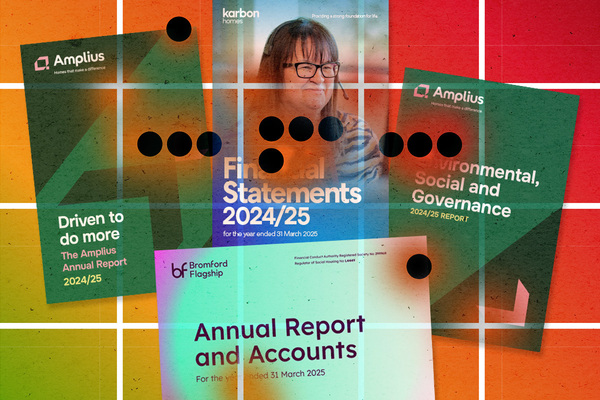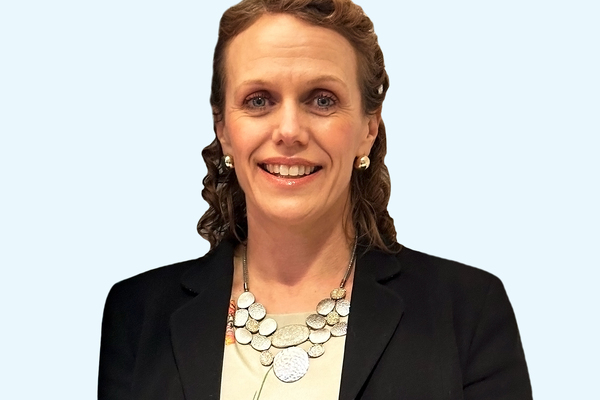You are viewing 1 of your 1 free articles
Section 28: the end of an error
Widely reviled by the LGBT community, Section 28 was finally repealed 15 years ago last month. But in housing, how much has changed since then? Gavriel Hollander finds out. Pictures: Alamy/Mirrorpix
Stuart* had been in his new job at a large national housing association for less than a week when the comments began.
“I was asked in front of an office full of people if I was gay,” he tells Inside Housing. “That put me on the back foot. I immediately said ‘no’ and the reaction was ‘good’. I thought, ‘Wow, so this is the culture I’m going in to’.”
A gay man, Stuart spent nine years at the organisation but never felt comfortable enough to come out to colleagues. Now a housing services manager at a different association, he could easily have been lost to the sector.
Although he describes a much better culture at his current place of work, the experience with his former employer has left scars.
Stuart spent nine years at the organisation but never felt comfortable enough to come out to colleagues
“At no point did I feel myself,” he explains. “You are permanently on guard and feel like you have to make things up. It’s uncomfortable and it’s horrible. It weighs you down.”
Stuart is by no means alone. Indeed, he tells Inside Housing that he knows of at least one friend who left the housing sector behind after enduring a culture of bullying at his association.
What did change between Stuart taking on that first job and eventually leaving it nine years later was the overturning of a controversial piece of legislation that some feel contributed to the discrimination and marginalisation of LGBT workers, particularly in the public sector.
Fifteen years ago last month, Tony Blair’s government repealed Section 28 of the Local Government Act 1988. Introduced 15 years previously by Margaret Thatcher, the provision stated that local authorities should not “intentionally promote homosexuality or publish materials with the intention of promoting homosexuality”.
Section 28 had a chilling effect on the LGBT community but it also coalesced grassroots opposition, culminating in its repeal in 2003.
With many people who have worked in housing for a long time coming from a local authority background, the repeal marked a sea change. But what affect did the legislation and its scrapping have on the sector? What is its legacy? And how does it shape up now in terms of its attitude towards LGBT staff and customers?
In terms of the last question, the answer isn’t all that positive. Inside Housing’s diversity survey at the start of the year revealed that only 12 out of 735 board members from associations that completed the survey identified as LGBT, while for executives the figure was 10 out of 331.
Meanwhile, further down the organisational chart, anecdotal evidence supplied by employees like Stuart suggests that attitudes aren’t always as enlightened as they could be.
When he took a complaint about one colleague’s behaviour to his HR team, he was less than impressed with the result.
“Everyone had to go through mandatory ‘E&D’ [equality and diversity] training but it was just a tick box,” he recalls. “It didn’t change anyone’s behaviour. They came out of it the same as they went in, saying they were entitled to their opinions and they couldn’t be shut up.
“They didn’t get it that at work there’s a level of decency that we expect everyone to maintain. They didn’t get that at all.”
"You would be very cagey about what you did at the weekend and anything that happened outside work", Sasha Deepwell
Sasha Deepwell, chief executive at Irwell Valley Housing Association, remembers all too well the effect Section 28 had on her and her peers.
“For a lot of people working in the sector now, it’s been a major part of our lives,” she says. “For a lot of us, for 15 years of our working life that clause was in operation. For most of my adult working life, and for vast numbers of lesbians and gay men, you would be very cagey about what you did at the weekend and anything that happened outside work.”
Ms Deepwell talks of a “migration” to the “very few sectors where you felt comfortable”. Although she says that housing was one of those, she admits to being “really careful” about where she chose to work.
And she agrees with Stuart’s belief that people have been lost to the sector because of prevailing attitudes, represented by things like Section 28.
“I know an awful lot of lesbians who have taken very low-paid jobs in the voluntary sector, because it’s where they feel the safest. The stress and anxiety and mental health problems that can result from living a double life really has an impact on people.”
But despite acknowledging that the 2003 repeal was “an important moment”, Ms Deepwell thinks the sector is “a little bit complacent on some of these issues” today.
She says the results of our January survey prompted her to speak out on the subject recently at Inside Housing’s Inclusive Futures Summit.
“The focus of the sector on this is really remiss,” she continues. “What was fascinating [about the survey] was the lack of any data at all in terms of board members or senior team members.
“If an issue is not high priority then they don’t measure it. The whole point is to find out what’s going on so you can improve a situation. The negligence to find out is pretty startling.”
Mark Washer, recently appointed chief executive at Sovereign, disagrees when it is suggested that housing has any particular problem when it comes to inclusion of LGBT staff.
“There is that thing about being authentic and bringing your whole self to work,” he says. “No, I haven’t felt that but I’ve been out since my mid-20s.”
However, he accepts that issues remain.
What was Section 28?
Section 28 of the Local Government Act 1988 was introduced by Margeret Thatcher’s government. It stated that local authorities, and by extension schools, “should not intentionally promote homosexuality or publish materials with the intention of promoting homosexuality”.
The intention was to prevent what some Conservatives saw as an erosion of “traditional moral values”.
Below is Margaret Thatcher’s 1987 party conference speech in which she said: “Children are being taught they have an inalienable right to be gay.”
The clause met widespread and sustained opposition from campaigners, who argued that it sanctioned homophobia and wrongly implied homosexuality was a choice.
It was repealed on 21 June 2000 in Scotland, but the rest of the United Kingdom had to wait until 2003 – 15 years ago last month – for its abolition under the New Labour government of Tony Blair.
“We’ve had equal opportunities policies for as long as anybody, so I do wonder whether there’s been a level of complacency,” he muses.
“Across the whole diversity spectrum, it’s important to continue to shine a light on these things or you can fall into the trap of thinking everything has changed when it hasn’t. If you stand still, you probably go backwards.”
Bob Green, chief executive of Stonewall Housing, an association set up in 1983 to provide specialist housing for the LGBT community, believes the attitudes that spawned Section 28 are still alive and well, if not as always apparent.
“Young people would still have experienced homophobia [without Section 28],” he declares. “It brought it to light and it was something to campaign against. Now you’re campaigning against a mindset rather than a piece of legislation. It’s harder to change hearts and minds than it is to change legislation.”
For Mr Green, the issue for housing organisations isn’t just about how they deal with their own staff – it’s about their residents. Research from the Albert Kennedy Trust earlier this year found that around a quarter of the UK’s young homeless population identified as LGBTQ+, with more than three-quarters of those citing their coming out to parents as a major factor.
This highlights the need for specialised housing, says Mr Green, bemoaning the fact that his organisation can only house people from boroughs with which it partners.
“That’s very short-sighted,” he continues. “It’s focusing on someone’s postcode rather than their needs or aspirations.”
"Now you’re campaigning against a mindset rather than a piece of legislation" Bob Green
He says LGBT residents across the country have a mixed experience, regardless of how much has changed in terms of the law.
“It depends on who your landlord is, and quite often on who your housing worker is and how well they’ve been trained to understand the issues around LGBT.
It’s very difficult if you’ve got a poor home life to have a good school life or work life. So you have to get it right with staff, as well as tenants.”
Mr Green believes that some associations need a cultural change that comes from the top down: “The board drives organisations and gives direction. They need to have an equality focus within their governance discussions or else what are they there for? If they’re only going to cater to the status quo then they’re not going to serve the minority communities or the communities that experience harassment.”
Stuart would certainly agree that the culture of different housing providers varies wildly, long after Section 28 was consigned to history.
“It should have been [the start of a change] but it’s still down to the individual organisation,” he states. And, crucially, he says that difference in culture filters down to how staff deal with LGBT residents.
He tells Inside Housing a story of how two gay men who were being harassed by neighbours were dealt with by a housing officer as an anti-social behaviour case and were told “to be a little bit discrete”.
“We’re housing people from all different backgrounds,” concludes Stuart. “If people have got certain beliefs, how do we know they’re not expressing them with people who are coming to us in need?”
*Name has been changed
Inclusive Futures
Inside Housing’s Inclusive Futures campaign aims to promote and celebrate diversity and inclusion.
We are pledging to publish diversity audits of our own coverage.
We are also committed to proactively promoting positive role models.
We will do this through the pages of Inside Housing. But we will also seek to support other publications and events organisations to be more inclusive.
Our Inclusive Futures Bureau will provide a database of speakers and commentators from all backgrounds, for use by all media organisations.
We are also challenging readers to take five clear steps to promote diversity, informed by the Chartered Institute of Housing’s diversity commission and the Leadership 2025 project.
THE CASE FOR CHANGE
34%
of housing association chief executives are female
1%
of housing association executives have a disability
1.6%
of housing association board members are LGBT
Women make up 46% of the UK workforce, but Inside Housing research found that they are under-represented on housing association boards (36%), executive teams (39%) and among chief executives (34%).
Almost a fifth of working-age adults have a disability (18%), yet associations reported only 1% of executives and 4.5% of board members with a disability. Many were unable to provide details.
Nationwide, 14% of the working-age population come from a BME background, climbing to 40% in London and Birmingham. Yet our research found that 6.8% of board members identified as BME, compared with 4.5% of executives.
Statistics on representation of LGBT people in the workforce are in short supply, but official statistics suggest that 2% of the total UK population identify as lesbian, gay or bisexual, rising to 4.1% for 16 to 24-year-olds. Our survey found that 1.6% of board members and 10 executives were LGBT – but most organisations were unable to provide figures.
THE INCLUSIVE FUTURES CHALLENGE
Inside Housing calls on organisations to sign up to an inclusive future by taking five steps:
Prioritise diversity and inclusion at the top: commitment and persistence from chief executives, directors and chairs in setting goals and monitoring progress.
Collect data on the diversity of your board, leadership and total workforce and publish annually with your annual report. Consider gender, ethnicity, disability, sexuality, age, and representation of tenants on the board.
Set aspirational targets for recruitment to the executive team, board and committees from under-represented groups.
Challenge recruiting staff and agencies to ensure that all shortlists include candidates from under-represented groups.
Make diversity and inclusion a core theme in your talent management strategy to ensure you support people from under-represented groups to progress their careers.
INSIDE HOUSING’S PLEDGES
We will take proactive steps to promote positive role models from under-represented groups and provide information to support change.
We pledge to:
Publish diversity audits: We will audit the diversity of the commentators we feature. We will formalise this process and publish the results for future audits twice a year.
Promote role models: We will work to highlight leading lights from specific under-represented groups, starting in early 2018 with our new BME Leaders List.
Launch Inclusive Futures Bureau: We will work with the sector to compile a database of speakers, commentators and experts from under-represented groups. The bureau will be available to events organisers, media outlets and publications to support them to better represent the talent in the sector.
Take forward the Women in Housing Awards: Inside Housing has taken on these successful awards and will work to grow and develop them.
Convene Inclusive Futures Summit: Our new high-level event will support organisations to develop and implement strategies to become more diverse and inclusive.
The Inside Housing Diversity Audit: how diverse has our coverage been?
The media plays a key role in championing diverse role models, so we designed a project to measure Inside Housing’s track record.
Related stories
